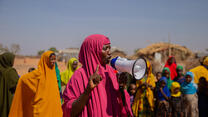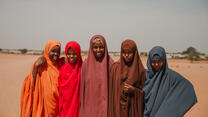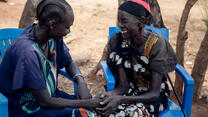WHO WE ARE
The mission of the International Rescue Committee (IRC) is to help people whose lives and livelihoods are shattered by conflict and disaster to survive, recover and gain control of their future. Our vision is that the IRC will lead the humanitarian field by implementing high-impact, cost-effective programs for people affected by crisis, and shape global policy and practice by sharing our learning and experience with others.
All IRC programs are designed to achieve meaningful change in people’s health, safety, education, economic wellbeing and ability to influence the decisions that affect their lives. The IRC is a global leader in transforming the lives of women and girls, and our Gender Equality Unit is dedicated to ensuring that all of our program outcomes are achieved equally by men and women, boys and girls, in the communities that we work.
THE PROBLEM
Women and girls around the world experience discrimination and lack access to equal opportunities. Men and boys often hold the social, economic and political power, and are prioritized across all areas of society. Whether its decision making within the family or community, access to education past primary school, decisions about bodily integrity or risk of gender-based violence, women and girls are marginalized, abused and passed over again and again.
Today, women and girls live in a world that is more insecure than ever in recorded history. More than 65 million people have been forcibly displaced due to conflict and persecution – nearly 34,000 people per day. During humanitarian crises, the exclusion and structural biases that women and girls face are compounded by insecurity and displacement. Women and girls in crisis are often specifically targeted for sexual violence and rape. Women and girls face greater restrictions on their mobility during crises when families sense that holding them closer is in their best interest. And women and girls often have limited access to basic services when resources are scarce.
At least 50% of refugees are women and girls, and yet across program areas, humanitarian aid is not designed and delivered based on an understanding of the specific constraints that women and girls face or the opportunities that are available to them. In fact, aid often replicates discriminatory social norms and bias in its delivery. Even the most basic best practices for gender equality go unheeded. For instance, we know that locks on latrines and showers will reduce the risk of gender-based violence, but it is an all too frequent oversight in WASH programming to ensure they are in place. Food aid is still often delivered directly to the male head of household despite the typical social role of women taking care of the household and feeding the family. In short, aid organizations are not effectively delivering to women and girls.
The IRC has led the humanitarian community in women’s protection and empowerment, and now wants to carve the way for successful integration of gender specific issues across all humanitarian programming as well as internally within our organization. Last year, the IRC conducted an internal organizational gender analysis to gauge where we need attention to address gender-based inequalities in how we operate and deliver aid. The findings were clear: across IRC outcome areas, IRC staff lack the awareness and technical expertise to design, implement, and evaluate programs, so they contribute to decreasing inequality for women and girls. While 62% of staff state that the IRC is committed to ensuring gender equality across all sector programming, 38% of staff do not feel they have the knowledge to carry out this commitment.
The Gender Analysis also suggested how norms affect the lives of our female staff worldwide. We are not actively and systematically addressing barriers that qualified women face in joining and staying in our workforce. The IRC has close to 25,000 staff worldwide – 37% are women (9,250). While the leadership board is 80% female, women only account for 25% of IPD Country Directors. Perhaps most importantly, the analysis suggests that female staff feel unsafe with the decentralized and inconsistent security practices in the field, and we likely have higher numbers of incidences of sexual harassment than reported.
HOW WE WILL ADRESS THE PROBLEM
The IRC is committed to the equality of women and girls in all of our programs and across our organization. We are working towards a humanitarian system where women and girls are unhindered by gender-based barriers to being healthy, educated, safe, economically self-reliant and able to influence the decisions that affect their lives due to IRC programming. By 2020, our vision is that the IRC is a thought and operational leader by using and generating evidence about what works best to achieve these ends, and combining programmatic intent with a bold pledge to ensure the equal treatment, promotion and support of its female staff worldwide.
In our efforts to make progress towards our 2020 vision, we are focused on ensuring the following:
- All IRC programs are designed and implemented with gender equality technical expertise. The IRC has close to two decades of program and global leadership in addressing gender-based violence and discrimination of women and girls through our Women’s Protection and Empowerment (WPE) programming. We are learning from and building on this experience to ensure that all of our programs address the complex inequalities for women and girls. When men and women, boys and girls, enjoy the same rights and opportunities, services become more effective and the entire community benefits.
- Globally, the IRC operates in a manner that addresses inequities and gender bias. The IRC understands the symbiotic relationship between how we operate as an organization and the success of the programming we deliver. By breaking down gender barriers and changing norms within our organization, we will unleash the potential for this to spill-over into the lives of our clients – male and female.
The IRC has established a Gender Equality Unit to drive the integration of principles of gender equality throughout our programming practices and organizational culture and policies. The role of the Gender Equality team is to act as the catalyst to stimulate, advise, and monitor the progress the IRC needs to make to meet its commitment to women and girls.
Most importantly, we know that change is possible. There are examples across the organization that prove we can make progress and achieve our vision for gender equality. For example:
- Many of our large-scale programs have a gender component and objective to address gender inequality. A large reading program in Pakistan – where 60% of the target students are girls and close to 15,000 teachers are supported – has staff dedicated to a specific and defined gender strategy. This includes delivering gender equality training to all teachers, incorporating gender equality into teacher manuals, and ensuring that all materials developed by the program include women and girls in non-traditional and leadership roles.
- Some of our country offices provide staff with flexible hours so they can manage their professional and personal obligations.
- IRC offices in the DRC, South Sudan, Burundi and Jordan design job descriptions to match the specific skills and competencies required for the job, rather than prioritize education levels or management experience – removing requirements that bias male recruitment.
- The female staff in the IRC Burundi office established a Women at Work group in 2012, providing space for female national staff to discuss common issues in their workplace and advocate for changes. Since their start, they have initiated new parental leave policies, the building of separate restrooms for men and women in the office, and professional development trainings for female staff.
The IRC’s intention is to expand these examples systematically across the organization and to transform the way we operate. We want our staff to have the same experience and opportunities, regardless of their gender. Our bold pledge, focus on both external programming and internal organizational changes, coupled with our committed leadership will allow us to ensure that we achieve equal outcomes for all IRC staff and beneficiaries.



